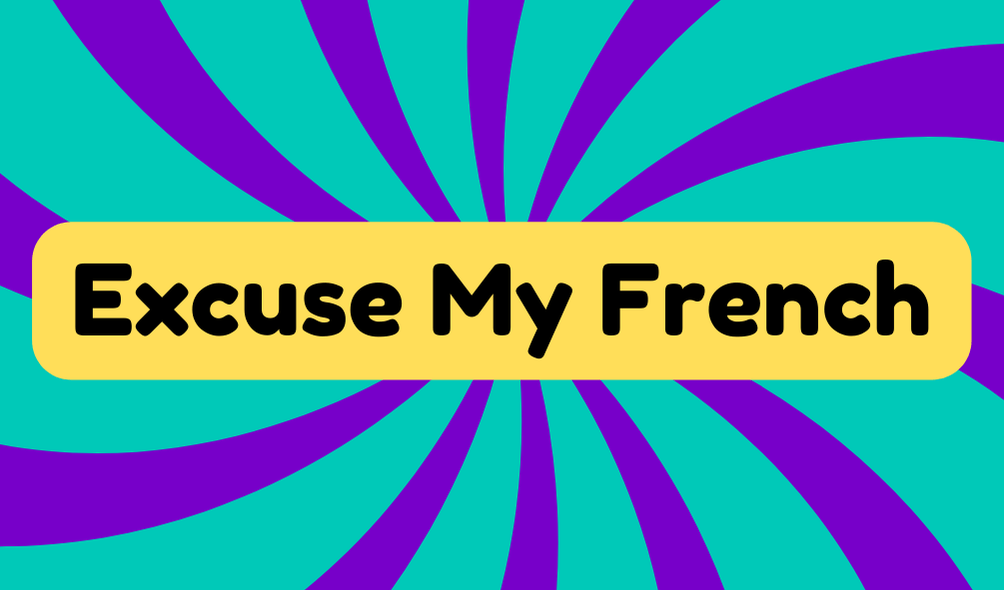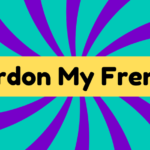The phrase "Excuse My French" originated in the 1830s as a way to apologize for using French terms. Over time, it evolved into a humorous preface for cursing or strong language. This expression reflects societal views on swearing, acting as a shield against potential outrage. It showcases how language adapts to cultural narratives, indicating a shift in norms. While often used flippantly, it raises questions about accountability in communication. Today, this phrase navigates the complexities of modern language use, emphasizing cultural dynamics. By examining its usage, one can better grasp its significance in everyday conversations.
Synonyms
The phrase "Excuse my French" serves a distinct purpose in everyday communication, particularly when the speaker intends to preface or mitigate the impact of profanity. However, there are various alternative phrases that can serve a similar function, reflecting cultural variations in expression. Consider the following examples:
- "Pardon my language"
- "Forgive my French"
- "Excuse my wording"
- "Please excuse my expression"
These alternatives not only offer freshness to dialogue but also illustrate the ongoing evolution of language. While some maintain a light-hearted humor, others may carry a weightier tone, showcasing the nuances in conveying respect for the audience. In a dynamic linguistic landscape, these expressions reveal deeper societal attitudes towards swearing and communication norms, enhancing our understanding of cultural interactions.
Example of Sentences
In everyday conversations, individuals often employ the phrase "Excuse my French" as a humorous preamble before expressing discontent or frustration. This expression serves as an intriguing commentary on cultural perceptions and language sensitivity. Here are some examples that illustrate its use:
- "Excuse my French, but that meeting was a complete disaster, just a load of bullshit."
- "Excuse my French, but that movie was absolute crap."
- "Excuse my French, but that was a hell of a game."
- "Excuse my French, but your attitude has been really annoying lately."
Through these sentences, one can see how the phrase acts as both an apology and a signal of social norms, embodying a complex relationship between humor, cursing, and cultural significance within modern discourse.
Origin
Originating in the 1830s, the phrase "Excuse my French" initially served as a straightforward apology for the use of foreign French terms among English speakers. It reflects a moment of linguistic evolution, where English speakers sought refinement by incorporating elements of French, a language associated with culture and sophistication. However, the usage transformed dramatically, influenced by the cultural perceptions surrounding the English-French rivalry, particularly during the Napoleonic Wars. What began as a literal apology morphed into a shield for profanity, revealing underlying anxieties about swearing. This shift underscores how societal norms and attitudes shape language use. Consequently, "Excuse my French" exemplifies the complex interplay between language and culture, serving as a linguistic artifact that mirrors historical tensions.
Collocations
Building upon the historical context of "Excuse my French," it is important to explore how this phrase has generated specific collocations in modern language. These collocation patterns emerge not just from the phrase's literal meaning, but also from its contextual usage in various settings. For instance, consider:
- "Excuse my French" before expressing frustration.
- The phrase acting as a humorous buffer for strong language.
- Its role in social interactions to signal accountability.
- Usage as a cultural critique of swearing conventions.
As this phrase evolves, it challenges traditional norms and reflects societal attitudes towards language and etiquette. By examining these collocations, we gain insights into how language adapts and reflects cultural complexities, which is essential for innovative communication.
How to Use in Everyday Language
Although "Excuse my French" may seem like a lighthearted phrase, it effectively serves as a versatile tool for steering conversations involving strong language or sensitive topics. To use it in everyday language, consider its contextual usage; employ the phrase before a curse word or vulgar statement to prepare your audience. Be mindful of cultural perceptions that come with this expression; it may not be received well in all settings. This phrase can help navigate uncomfortable discussions while maintaining a semblance of politeness. Yet, relying heavily on it could detract from the seriousness of the conversation. Ultimately, using "Excuse my French" requires a discerning approach to guarantee it enhances rather than undermines communication.
Why Is It Still Relevant Today?
The phrase "Excuse my French" remains relevant today due to its ability to navigate the complexities of modern communication. In a world increasingly aware of cultural perceptions and language sensitivity, this expression serves as a humorous safeguard against the potential offense of profanity. It highlights how social norms dictate language use and reflect evolving attitudes toward swearing. However, its continued usage also raises questions about linguistic accountability; are we using humor to bypass genuine dialogues regarding language choices? As society embraces inclusivity and sensitivity, understanding the implications of such phrases becomes essential. Consequently, while "Excuse my French" may provide a momentary shield, it challenges us to reflect on deeper cultural dynamics in our everyday conversations.






